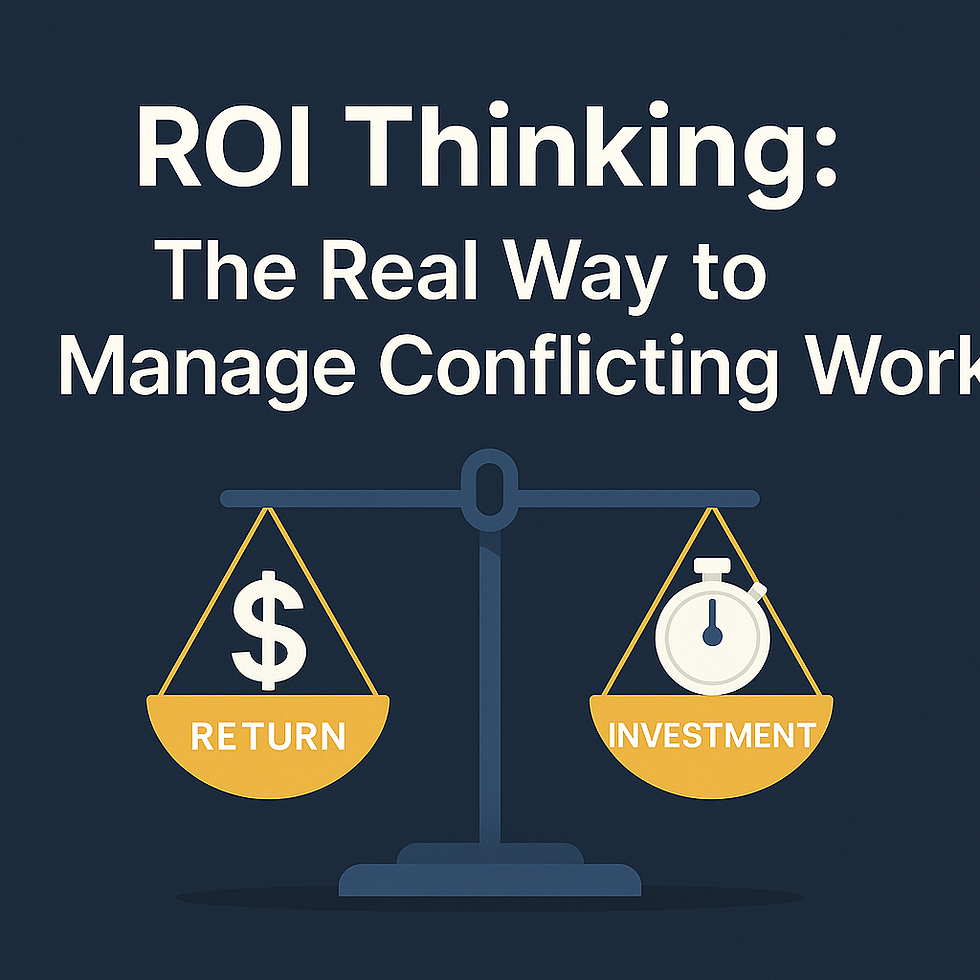The Invisible Struggle Between Being a Leader and Becoming a Manager
- Admin
- Jul 2, 2025
- 5 min read

(and why even executive MBAs might not solve your midlife career crisis)
Yesterday, I wrote an article about being a leader versus a manager.
I wrote it because so many people go through a mid-career identity crisis. It’s real. It’s common. And it hits harder than people expect. Especially in the software engineering world, where “growth” often feels like a fixed staircase — and you’re always one step behind.
There’s a subtle pressure that creeps in.
It’s not just internal. It’s social.
You hear things like,
“She got promoted last cycle.”“He’s already a manager with the same number of years.”“Why not you?”
And before you even realize it, your mind is swirling. You start rethinking your path, your pace, your own worth. What was once music turns into noise — a loud, nagging dissonance in your own ears, sometimes compounded by the people sitting right next to you.
So, yeah. That’s why I wrote the piece. To offer perspective. To educate a little. To calm some of that chaos down.
Let’s be honest — being a leader is underrated. Being a manager, on the other hand, is over-celebrated.
In our world, people chase the manager tag. Not because it's always the right fit — but because it comes with perks, visibility, influence. It unlocks doors that being a quiet leader often doesn’t.
And I get it. I really do. The structure of most organizations is built that way. The manager path is the party most people are invited to. If you don’t join, it feels like you missed something.
But here's where things go sideways:
People start chasing the title, not the impact.
They forget what kind of person they actually are.
Some might have not figured out what they like, and just follow the herd mentality of being a manager.
Many times these are people who do not lack skills. In fact, these are usually people with real substance — 10, 15 years of experience. They've built things, mentored others, taken responsibility without being asked. They’ve led even without the label.
And yet, they still feel like they're stuck. Like they’re invisible. Like they’re ready… but somehow not chosen.
Why?
It gets worse as they look at their peers, their old college friends, even folks who were once junior to them — and see them now managing teams, running orgs, making decisions.
And they think:
“They don’t look different from me.”“We have the same skill set.”“Why not me too?”
So they try to play the game.
Some people start tweaking their résumé — almost reshaping their own past, just to look like they’ve been in management.
They reframe their past roles. Insert managerial language. Position themselves for the next opportunity.
And still… it doesn't always land.
Because management, ultimately — as I said in the other piece — is top-down.
You can want it. You can earn it. You can prepare for it.
But unless someone hands it to you, you don’t get it. That’s the frustrating truth.
Even the companies that talk about "skills over titles" or “flat hierarchies” — they still promote internally.
They don’t hire pre-fabricated managers off the street all the time. Many of them do promote staff engineers to managers. They trust internal people who already know the culture.
So why not give that same trust to external candidates?
Even when someone’s being genuine — not faking anything, just stating it how it is — companies often hesitate. They want a track record with the title, not just the substance behind it.
And that disconnect? That’s where people feel lost.
They start questioning not just their résumé, but their entire career path.
And that’s just one kind of midlife career crisis.
There’s another one — equally common, equally painful.
It starts when people look around and realize they’re surrounded by juniors climbing faster. Or peers who “seem” to be growing, even if you’re not quite sure how.
So, in a desperate attempt to move forward, they start course-chasing.
You know the pattern.
It feels like the smart thing to do.
And honestly? In many cases, it is.
Some courses help. They open doors.But let’s get real about the other end of the spectrum.
There are people dropping $20K, $50K, even $100K on executive MBAs — from Berkeley, Illinois, Wharton, and beyond.
Why?
Because they believe, deep down, that this degree will be their gateway into management. Their ticket to the senior director seat. The proof that they now understand “business.”
But here’s the reality:
Nobody guarantees you that promotion. No course — no matter how elite — comes with a job offer. And the degree? It might still leave you waiting.
If it’s just a Coursera course, fine. You lose a few hundred bucks.If you don’t complete it? You shrug.
But if it’s an executive MBA?
Now you’re looking at years of sacrifice.
And if you’ve got kids, a mortgage, a full-time job?
You’ll find yourself staring at a screen on a Sunday night, with laundry piling up and Slack still open, asking yourself:
“What exactly am I doing this for?”
Because it’s not just about money. Though yes, even $20K is not easy to ignore.
It’s about time. Energy. Mental capacity.
And when you're burning your weekends chasing a promise with no guarantee — you're going to feel it in your soul.
Let me be clear: I’m not anti-MBA.
But I am calling this out for what it is.
If you’re signing up for a pricey degree solely because you think it’ll make you a manager — you’re setting yourself up for disappointment.
We’re living in an era where AI is reshaping teams, hierarchies are flattening, and visibility doesn’t always translate into value.
The pressure is from all sides.
So it’s no wonder so many talented professionals — good-hearted, hard-working folks — get pulled into this whirlwind of certifications, programs, and credentials.
But here’s the twist:
This might not be your path.
This might not be the solution.
There are other approaches — smarter, leaner, more grounded. Things that might actually work.
We’ll explore those in the next article.
For now, I just wanted to say this out loud:
If you’re in the spiral, you’re not alone.And if the course or title you’re chasing feels empty, it’s okay to pause. You’re not failing — you’re just waking up.



Comments